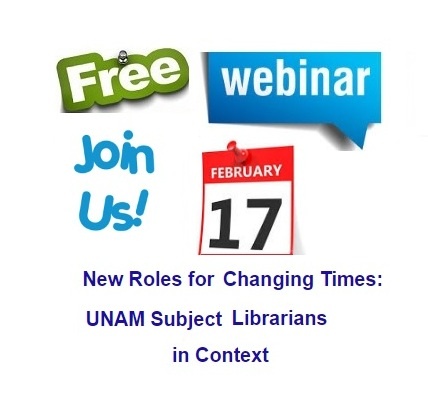Join the second A.S.I.R.A.'s free Webinar !


A.S.I.R.A. (Access to Scientific Information Resources in Agriculture) Online Course for Low-Income Countries started on 13 February, 2017. Throughout the course, several webinar sessions will be held based on the subjects taught in the units. These webinars are open to anyone who is interested in the subject. The second webinar will be held on 17 February (Friday), 2017. Register by 16 February. No need for ASIRA Online Course participants to register.
___________________________________________________________________________________________________
You are invited to the second webinar of the A.S.I.R.A. Online Course for Low-Income Countries offered by FAO of the United Nations in collaboration with Research4Life.
A.S.I.R.A.'s webinars are specially designed for the course participants but also open to anyone who is interested in the subject.
Our speakers come from diverse background come together to complete the flavour of the course, sharing their experience and expertise in their fields.
Here is the information about the second webinar entitled New Roles for Changing Times: UNAM Subject Librarians in Context:
Date & Time: | Friday 17 February, 2017 15:00 CET |
Register | By 16 February, 2017 HERE NOTE: no need for A.S.I.R.A.’s course participants to register |
Presenter: | Chenjerai Mabhiza (Head of User Services at the University of Namibia) |
This Webinar contextualises/ discusses the changing roles of Subject Librarians at the University of Namibia (UNAM) in view of new research support, scholarly communications, information literacy, bibliometrics and data management support services.
For a number of years subject librarians at UNAM performed traditional roles synonymous with African university libraries, with regard to supporting the curriculum and scholarship of the university, in relation to teaching and learning.
Traditional roles focused on collection development, cataloguing, classification & indexing, and discovery of information. The changing publishing trends, the open access movement, and textbook and journal supplier models, among others have resulted in a new information ecosystem that has impacted on the information managers and knowledge officers globally, including subject librarians at UNAM.
In a bid to align our services with the needs of today's students, researchers and members of faculty, we have added new functions to the roles of subject librarians. A summary of selected new roles are presented below:
Undergraduate Students Support: We mentor undergraduates to develop research, critical analysis, and information literacy skills. Through Information literacy (IL) instruction, we train undergraduate students to demonstrate knowledge and application of skills in two areas, namely: (a) Information seeking, which concerns searching for and identifying relevant and up-to-date sources which are applicable in one's research area; and (b) literature search and research strategies.
Postgraduate Students Support: In one of my roles as Postgraduate students and Research Librarian, I have introduced postgraduate students` research consultations. In these sessions, I engage postgraduate students and doctoral candidates with a view to enable them to acquire critical assessment skills, which involve scanning, analysing, summarizing and integrating sources so as to identify reliable, valid and credible material; formulating focused research topics, problem statements and research questions; carry out in-depth literature reviews; and help define each student`s research area using a checklist of 10 questions.
Research Process and Support (Lecturer and Faculty): as subject librarians we provide active support that helps to increase the productivity of lecturers` research, departmental and faculty scholarship. We profile the current and changing faculty research interests first. Understanding of a typical researcher`s experience, including their workflow, and how researchers access and use information within a discipline/ subject and at different stages of the researcher`s career is important in this type of service.
Scholarly Communications: We advise research students and members of faculties on current trends, best practices and available options in research publication and dissemination methods and models nationally and internationally, including scholarly communications and open access publishing. We advocate for suitable models of scholarly communications and also promote preservation of faculty research outputs in the UNAM Institutional Repository administered by the Library.
Chenjerai Mabhiza is Head of User Services at the University of Namibia. The Library provides various library and information services in support of the university goals of teaching and learning, study and research. The Head of the User Services Department caters for the information, study and research needs of faculties and students. Additionally, Chenjerai is a member of the Research4Life Advisory Council and also serves as Namibia`s INASP country representative. Part of his daily responsibilities is to help ensure that the library is the digital-backbone of research across UNAM`s 12 campuses. He is a part-time lecturer offering courses in literature review and research methodology. |
Related content: Interview with Chenjerai Mabhiza about the Forum on Open Data, Open Science and Open Access to Information in Agriculture

